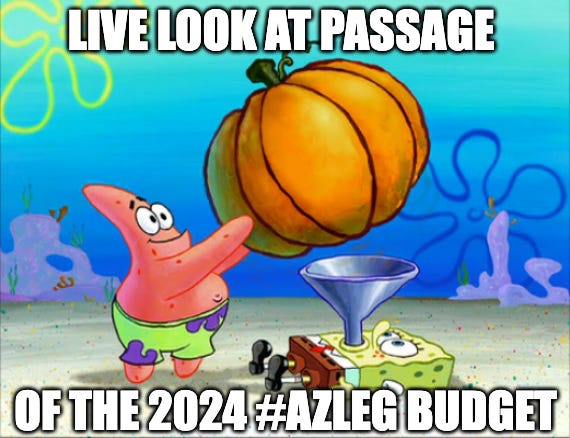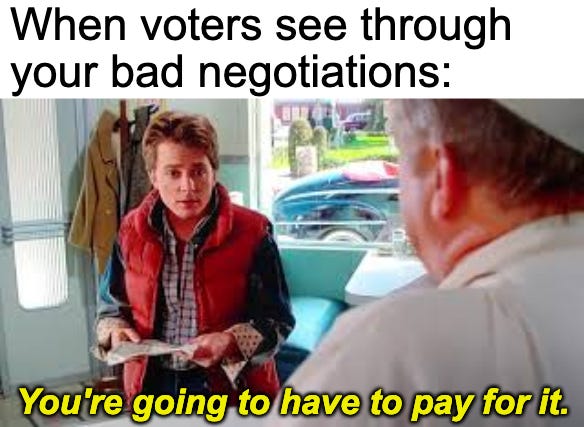CEBV Weekly: June 17, 2024
A budget is a statement of values; this one stinks. A flotilla of ballot referrals. On to election season.
The sausage is made. A budget deal emerged this week, negotiated by Gov. Katie Hobbs and Republican legislative leaders Ben Toma (R-27) and Warren Petersen (R-14). Lawmakers passed this budget and adjourned for the year, closing Arizona’s voucher-and-tax-cut-driven deficit by making major cuts across the board, from higher education to roads and water — while, for the second year in a row, leaving Arizona’s $1-billion-a-year voucher grift largely untouched.

Cuts to roads & public safety. In the House Appropriations Committee on Wednesday, a representative for the City of Buckeye pleaded for the Legislature not to cut the city’s I-10 widening funds, saying the project was “shovel-ready” and postponing it would directly impact public safety. Likewise, a representative for the city of Maricopa begged the committee not to postpone an overpass, saying the project would eliminate most accidents that happen at the fourth most dangerous intersection in the state highway system. House Appropriations chair David Livingston (R-28) responded, "I couldn't find a way to balance the budget without taking that out" — even though trimming universal ESA vouchers would have easily covered both those projects, and many more, by saving Arizona $332 million this year and $429 million next year.
Cuts to K-12 education. This budget eliminates the “opportunity weight” instituted just last year, which was an additional $37 million a year for low-income students who need significantly more resources in order to succeed. This marked a significant and welcome shift away from former Gov. Ducey’s harmful insistence on funding most the wealthy schools that need it least. This budget also cuts $29 million in capital funding for expenses like books and buses. The deal promises to restore the funds in three years, as Republican lawmakers have convinced themselves that, by then, our state will somehow be out of this hole. However, the deal does not compel future lawmakers to provide funding, and it does nothing to address the disastrous one-two sucker punch of tax cuts for the wealthy and universal ESA vouchers. Like the money for all-day kindergarten negotiated into the 2007 budget which was cut in 2010 and never restored, these are investments we may not see again.
Cuts to higher education. As the Arizona Agenda reports, more than half of the 3.5% cuts to major state agencies (a total of about $44 million in cuts) is coming from our three state universities. Community colleges also bear a disproportionate share of the hit. As a representative for the Maricopa County Community College District testified, the cuts in this budget of $53.9 million statewide — representing a 40% cut to total state investment — mean the community college system will be forced to decimate critical workforce programs they developed specifically because lawmakers asked for them. These include a nurse education pilot program, dual enrollment programs, and programs that help adults gain high school diplomas. (Watch the MCCCD representative’s 60 seconds of testimony here.)
“The university and all other state educational institutions shall be open to students of both sexes, and the instruction furnished shall be as nearly free as possible.” — Arizona Constitution, Article 11, Section 6
Splintered caucuses. On Friday, Democrats in both chambers balked at the deal that Hobbs negotiated without them, forcing both the House and Senate to adjourn for the night rather than push through the wee hours as is typical. But in the morning, it became clear that a few House Democrats had peeled away from their caucus to help negotiate amendments to the package. These amendments lent the package just enough support to pass, but also circumvented many of their fellow Democrats who remained fiercely opposed. House Minority Leader Lupe Contreras (D-22) expressed frustration that GOP budget negotiators were "buying off" Democratic lawmakers, and made it clear that he thinks Democrats would have gotten more if they had been included in negotiations from the start. But the deal was done.
Pulling teeth. Saturday’s first vote on the first budget bill lasted an excruciating 27 minutes and eventually squeaked through the House by a single vote. Many of the furthest-right MAGA lawmakers voted no, but otherwise votes split seemingly at random, in a much more bipartisan fashion than last year’s budget. The voting lasted all day; at one point the House asked for a budget bill back so they could amend it further before sending it to the Senate. And, by the time budget bills got to the Senate, the once-unified Democratic opposition there had splintered.
The buck stops at the top. The ultimate responsibility for this budget deal rests with Gov. Katie Hobbs. It’s certainly a better deal than last year’s, the one that had MAGA Republicans celebrating the fulfillment of their every wish. But that’s not a very high bar. For the second year in a row, Hobbs played her hand weakly, achieving a handful of smaller wins to brag about but losing big in the major areas that matter most such as school vouchers. Republicans ran the show on the legislative level, displaying bad behavior that went largely unchecked. And for a second year, Hobbs shrouded her negotiations in a fog of secrecy just as former Gov. Ducey had, shutting out a supportive public and damaging her own ability to negotiate the best budget for Arizonans.
Overloading the ballot. Traditionally, a budget deal also means “horse trading”: the passage of long-stalled bills that were negotiated as the price of one or more lawmakers’ budget votes. You’ll see some of these in the “Veto Watch” section below. But this year, many of them were harmful ballot referrals. Legislative Republicans rammed through 5 more referrals this week alone, which makes a total of 13 on our November ballot.
SCR1012, Kern (R-27), asking voters to ban Arizona agencies from creating rules that would increase regulatory costs, and instead require the Legislature to put the proposed rule into law. This would kneecap Hobbs and Mayes' ability to regulate unaccountable, wasteful spending such as in the universal ESA voucher program.
SCR1023, Mesnard (R-13), asking voters to amend the Arizona Constitution to require cities and school districts to hold their elections on general election days only.
SCR1040, Mesnard (R-13), asking voters to amend the Arizona Constitution to create a submininum hourly wage for tipped employees that is up to 25% lower than statutory minimum wage.
SCR1041, Mesnard (R-13), asking voters to amend the Arizona Constitution to allow anyone to sue to knock a citizen initiative off the ballot on grounds that it is not constitutional, in yet another attempt to stifle citizens’ initiatives. Signature gatherers would have to fundraise to defend themselves against legal challenges before they even turn in any signatures.
SCR1044, Gowan (R-19), asking voters to amend the Arizona Constitution to keep judges in Arizona’s most populous counties appointed until the mandatory retirement age of 70 instead of retained by the voters. The measure is written retroactively, so if voters pass it, the entire judicial retention slate for November would be thrown out, including for Supreme Court Justices Clint Bolick and Kathryn King, and all the judges would stay in office.
Republican-only. Each of these measures passed along partisan lines, with only Republicans in support. Ballot referrals circumvent the governor, so Hobbs could not veto them.
Shady stuff. All the bills are eyebrow-raising, but in particular, SCR1044:
Shawnna Bolick (R-2), who is married to Arizona Supreme Court Clint Bolick, voted to protect her husband's seat on the Arizona Supreme Court by advancing this bill. Had she recused herself, the bill would have failed to advance to the ballot.
One of the three judges that Maricopa County voters chose not to retain in 2022, Rusty Crandell, now works for Arizona legislative Republicans as their General Counsel, where his job duties include advising lawmakers on bills like SCR1044.
Hurting our democracy. According to Maricopa County election officials, anything more than 7 ballot measures will require a second ballot page. Republicans have now placed an astounding 13 measures on our November ballot, leading to fears that Arizonans will face an unprecedented 3-page ballot. This means longer lines at the polls, the risk of voters returning only one page of their mail-in ballot, poll worker mistakes when handing out a multiple-page ballot, and more paper and higher postage costs — in short, all costs to democracy.
On the Governor’s Desk
GOP lawmakers passed the below bills, which CEBV oppose, this week. They now await Gov. Hobbs’ veto. You can email the governor’s team at engage@az.gov to request she do just that.
SB1155, Shamp (R-29), would limit those serving lifetime probation for a sexual offense from asking the court for relief until 10 to 20 years had passed (depending on the type of conviction). Read this excellent Twitter thread from a public policy advocate on why mandatory minimum sentences are a terrible idea. The sponsor introduced the same bill last year, which failed to pass. OPPOSE.
SB1370, Bolick (R-2), would ban cities from requiring businesses run by youth under 18 to be licensed or pay sales taxes if they make under $10,000 per year. This bill would prop up for-profit fairs that are closely tied with Arizona private schools and pro-voucher lobbyists. Removing requirements for licensure opens the door to exposing kids to predatory practices or exploiting kids whose parents receive state tax dollars to spend on their kids’ businesses, often in lieu of school instruction. It also cracks the door open to rolling back child labor laws, as is happening in multiple other states. OPPOSE.
HB2017, Griffin (R-19), would allow builders to mix groundwater with river water or wastewater that serves other communities so they could undercut current state regulations on groundwater-reliant development. Currently, developers are required to show a 100-year assured water supply before they can build homes. OPPOSE.
HB2376, Lupe Diaz (R-19), would block private individuals from selling or giving property to the federal government without express permission from the legislature. The idea seems to be to stop executive actions that set aside land for national monuments — not only threatening conservation efforts, but Arizona’s $1.4 billion outdoor recreation industry and the local economies tied to it. OPPOSE.
HB2389, Kolodin (R-3), would ban the sale of any motor vehicle in Arizona if it can be remotely shut off by someone not the owner of the vehicle who does not have a physical key. The National Highway Traffic Safety Administration is working to develop "passive" driver alcohol detection, using sensors that measure alcohol in a driver's skin or breath, as potential new standard equipment in new vehicles to prevent alcohol-related accidents and deaths. Alcohol-related crashes kill over 10,000 people every year nationwide. Opposition to the plan seems to center on the misbelief in a right to drive while drunk. Driving is a privilege; the US Constitution guarantees a right to travel, but not the right to drive. OPPOSE.
HB2719, Carbone (R-25), would make it harder for school bonds and overrides to pass by requiring them to have 60%+ voter approval. In effect, this measure would stop school districts from ever getting badly needed bonds or overrides passed again. The measure also applies to cities, counties and community college districts. Part of this year’s GOP package of bills to make wide-ranging, harmful changes to Arizona elections. OPPOSE.
SB1511, Shamp (R-29), would force insurance companies to pay the medical costs for those who want to “detransition” from sex changes “and reclaim their God-given gender.” Shamp says she based the bill on her belief that “political ideology” is driving gender-affirming care. Critics say the bill is designed to harass insurers and providers with fear-mongering about future “liability” and to throw up unnecessary obstacles for transgender people getting the same types of care that cisgender people do. The bill is being pushed by the evangelical Christian lobbyist group Center for Arizona Policy. OPPOSE.
⏰ If you have 15 minutes: Write to Gov. Hobbs and ask her to veto one or more of the bills listed in “Veto Watch” above.
⏰⏰ If you have 45 minutes: Arizona desperately needs a more reasonable legislature. Find a competitive legislative district near you1, then sign up to volunteer for, or donate to, the candidates that best represent your values.
⏰⏰⏰ If you have 60 minutes: Join us on Zoom at 4pm on Sunday for our next CEBV Happy Hour conversation! This week we’re thrilled to feature Joseph Darius Jaafari, the founder and editor in chief of LOOKOUT, an independent news outlet centered on LGBTQ+ issues. We’ll meet every Sunday at 4 PM through the end of session. Sign up here.
2024 Timeline
Monday, 7/1 Last day to register to vote for primary election Tuesday, 7/30 Primary election Monday, 10/7 Last day to register to vote for general election Tuesday, 11/5 General election
Flag this handy list of contact info, committee chairs and assignments, updated for 2024.
Bookmark CEBV’s Linktree. Want to attend a Civics, Messaging, Water, Persuasion, Letters to the Editor, or other training? Ready to register for an upcoming Spotlight Conversation or view a past one? Need to stay informed? Looking for our social media, inspiration, or self-care tips? It’s all here on our Linktree:
















